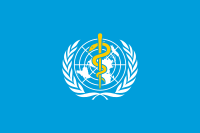
Photo from wikipedia
Affordable access to medicines is a key determinant of a country’s resilience to health crises. The modern hyper-connected international trade and production networks have a vital role to play in… Click to show full abstract
Affordable access to medicines is a key determinant of a country’s resilience to health crises. The modern hyper-connected international trade and production networks have a vital role to play in ensuring this accessibility, especially in the context of a pandemic. This article focuses on medicines and medical equipment and analyses the synergistic role of the two international organisations—The World Trade Organisation (WTO) and The World Health Organisation (WHO), in assuring affordable access to these goods globally. WHO is responsible for global healthcare regulations; however, the medical supply chain originates in a few developed countries, manufactured in bulk (in case of medicine) at low cost in developing countries, and finally traded worldwide. Here, the role of WTO comes in where it facilitates global trade cooperation and intellectual property rights monitoring, both key elements in medical goods production and trading. Despite the need for cooperation in mitigating COVID-19, much of the global response to COVID-19 has been fragmented and inward-looking. This lack of coordination has serious repercussions especially for developing countries. We use qualitative content analysis methodology, connecting concepts of cooperation theory and global governance to identify the joint role of the two organisations in fostering global cooperation in medical goods accessibility.
Journal Title: India Quarterly
Year Published: 2022
Link to full text (if available)
Share on Social Media: Sign Up to like & get
recommendations!